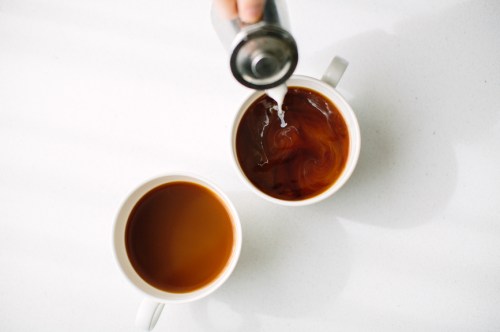Our editors independently select these products. Making a purchase through our links may earn Well+Good a commission
Why Coffee Always Tastes Better at a Coffee Shop, According to a Barista—And How To Up Your Coffee Brewing Game at Home
Here are three reasons why coffee shop coffee tastes better and how to up your at-home brewing game, according to a roast master.

No matter how much fancy equipment we invest in to brew coffee at home (Chemex! Burr grinder! Fancy pour-over kettle thingy!), the iced dirty chai lattes that we pick up at our local coffee shop still always seem to taste just a little bit better. While it could be a figment of our under-caffeinated imagination, there’s no denying the fact that professional coffee brewers do know best—which is why we asked a roast master and brewing expert technologist why coffee shop coffee is always a step above our own.
Experts in This Article
coffee technologist and curator
In short, it comes down to the techniques that coffee experts have mastered to make the perfect cup of joe, which play a significant role in how delicious a cup of coffee tastes. The good news? There are a few simple ways to elevate your coffee brewing game at home so you won’t always have to leave your house to get a soul-soothing cup of coffee.
3 reasons why coffee always seems to taste better at a coffee shop
1. Baristas have tons of knowledge about making coffee
“In addition to the knowledge, skills, and experience professional baristas have, coffee shops themselves are also stacked with professional equipment,” says Genevieve Kappler, Roasting Plant Coffee’s roast master and brewing expert technologist. This means more consistency and precision is applied when brewing coffee, which is a huge part of making a top-quality cuppa. (The ideal water temperature for brewing coffee, for instance, is 195°F to 205°F. Very few drip coffee machines you’ll find for home use can reach that range.)
“And for those seeking specialty drinks, coffee shops also tend to have more variety in syrups, flavors, and milk offerings than the average coffee consumer may have at home,” Kappler adds.
2. They use super-fresh coffee beans
Fact: top-quality coffee shops use extremely fresh (and freshly-ground) beans. “If you’re looking for just a great cup of coffee, the best-tasting coffee will come from a coffee shop that focuses on high-quality, fresh beans,” Kappler says.
3. They roast their coffee beans in-house
So, what exactly makes coffee beans qualify as super fresh? Well, it mostly depends on how recently they’ve been roasted. “The rule of thumb is seven to 21 days after roasting the coffee is best; however, there isn’t a set expiration date. Just know the beans will lose flavor over time,” Makenzie Bryson Jackson, MS, a food scientist, previously shared with Well+Good. One way to get the freshest beans is by sourcing ones that do it in-house.
“Ideally, coffee beans are roasted in-store, so prioritize specialty shops that have this capability,” Kappler says. “However, it is rare, and many shops can’t offer that. So for those that can’t, try just asking when their beans were roasted. Research shows that roasted coffee is inherently volatile and can lose 70 percent of its flavor and aroma in a week or two. After that, exposure to oxygen turns the natural oils rancid and bitter. If a shop doesn’t know when their coffee was roasted, chances are it’s probably stale,” she says. (Hint: This also means that the coffee you’ve been hoarding in your pantry for months is well-past its expiration date and probably the reason why your morning brew tastes so darn bitter.)
How to elevate your coffee-making game at home
So, how can you elevate your lattes and pour-overs at home? Making sure your beans are fresh is the first step. “To make coffee shop-quality coffee at home, start with the basics: Get good beans that are actually fresh. You can pick up beans from a local specialty roaster or even order online,” Kappler says. Some coffee companies, like Roasting Plant Coffee, do their roasting upon order to ensure your beans arrive as freshly-roasted as possible.
Kappler also suggests investing in a good grinder. “Consider purchasing a good burr grinder like a Baratza or a TIMEMORE hand grinder. Having a good grinder allows you to grind right away before brewing, ensuring beans are left in the freshest, whole bean state for as long as possible before brewing,” Kappler says.
Furthermore, Kappler adds that you shouldn’t keep more coffee on hand than you can consume within a week or two. “Another common mistake at-home coffee drinkers make is storing coffee too long at home. Roasting Plant suggests following the seven to 10-day rule for optimal freshness and, therefore, better taste. People don’t typically think of coffee beans as a food that can go bad, but coffee drinkers should learn to treat their coffee beans like fresh fruit and vegetables or baked goods—they’re highly perishable and so much tastier when fresh,” she says.
Rise and shine. It’s coffee time:








